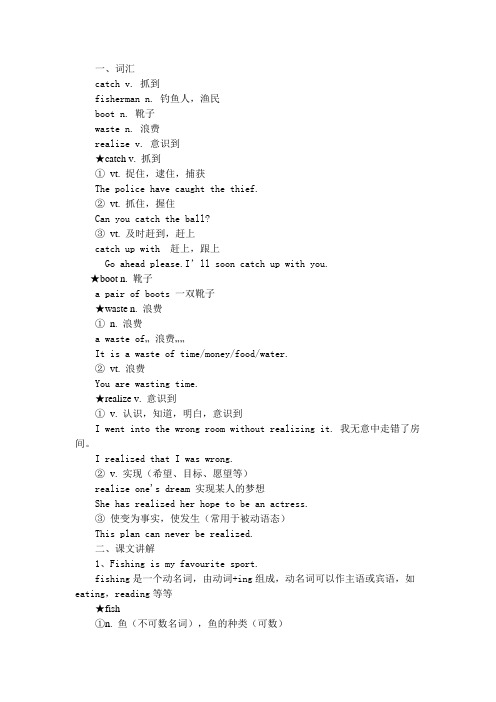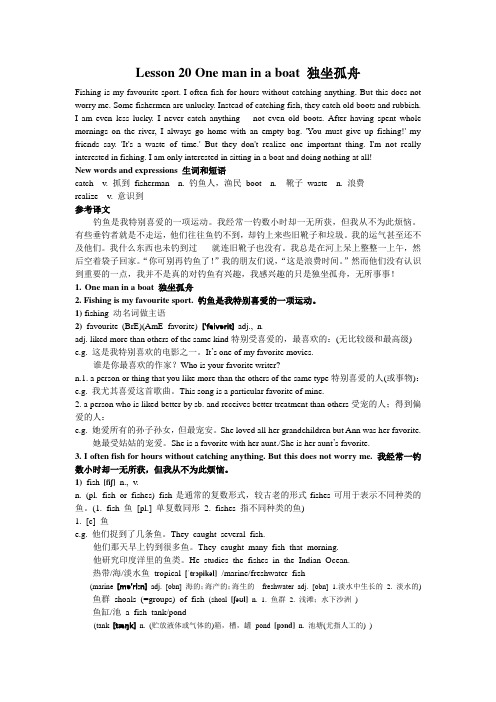新概念英语第二册第20课_
(完整版)新概念英语第二册第20课课文讲解

一、词汇catch v. 抓到fisherman n. 钓鱼人,渔民boot n. 靴子waste n. 浪费realize v. 意识到★catch v. 抓到①vt. 捉住,逮住,捕获The police have caught the thief.②vt. 抓住,握住Can you catch the ball?③vt. 及时赶到,赶上catch up with 赶上,跟上Go ahead please.I’ll soon catch up with you.★boot n. 靴子a pair of boots 一双靴子★waste n. 浪费①n. 浪费a waste of… 浪费……It is a waste of time/money/food/water.②vt. 浪费You are wasting time.★realize v. 意识到①v. 认识,知道,明白,意识到I went into the wrong room without realizing it. 我无意中走错了房间。
I realized that I was wrong.②v. 实现(希望、目标、愿望等)realize one's dream 实现某人的梦想She has realized her hope to be an actress.③使变为事实,使发生(常用于被动语态)This plan can never be realized.二、课文讲解1、Fishing is my favourite sport.fishing是一个动名词,由动词+ing组成,动名词可以作主语或宾语,如eating,reading等等★fish①n. 鱼(不可数名词),鱼的种类(可数)There are a lot of fishes(表示种类)in the sea.②v. 钓鱼, 捕鱼2、I often fish for hours without catching anything.for+时间表示一段时间for hours=for some hours 数小时without catching anything作为状语而出现, 表示结果状语。
新概念英语第二册第20课

Lesson 20 One man in a boat 独坐孤舟Fishing is my favourite sport. I often fish for hours without catching anything. But this does not worry me. Some fishermen are unlucky. Instead of catching fish, they catch old boots and rubbish.I am even less lucky. I never catch anything -- not even old boots. After having spent whole mornings on the river, I always go home with an empty bag. 'You must give up fishing!' my friends say. 'It's a waste of time.' But they don't realize one important thing. I'm not really interested in fishing. I am only interested in sitting in a boat and doing nothing at all!New words and expressions 生词和短语catch v. 抓到fisherman n. 钓鱼人,渔民boot n. 靴子waste n. 浪费realize v. 意识到参考译文钓鱼是我特别喜爱的一项运动。
我经常一钓数小时却一无所获,但我从不为此烦恼。
有些垂钓者就是不走运,他们往往鱼钓不到,却钓上来些旧靴子和垃圾。
我的运气甚至还不及他们。
我什么东西也未钓到过-- 就连旧靴子也没有。
新概念二 第20课课件

第20课 One man in aboat 独坐孤舟
1.New words 2.text
3.grammer
New words and expressions
New words and expressions
• 1.catch (1.1) /kæ tf/ (caught /ko:t/, caught)v.抓到 • 2.waste(1.6)/werst/n.浪费 • 3.fisherman (l.2)/'fifəmen/n.钓鱼人,渔民 • 4.realize (1.7) /'rielaiz/v. 意识到 • 5.boot (1.3)/bu:t/n.靴子
课文注释
1.l often fish for hours without catching anything. 我经常一钓数小时却一无所获。 without 通常表示“缺乏”、“没有”: I can't repair the car without your help. 没有你的帮助我无法修理这车。 当它位于动名词前时,它表示“不曾”、“不”; They tried to leave the restaurant without paying 他们企图不付账就离开餐馆。
John left the room without telling anyone. 约翰离开房间时不曾告诉任何人。
课文注释
2.Instead of catching fish, they catch old boots and rubbish. 他们往往鱼钓不到,却钓上来些旧靴子和垃圾。 instead有“作为替代”、“反而”等含义,一般以短语形式instead of出现: Jack took part in the race instead of Tony 杰克代替托尼参加了比赛。
新概念英语第二册20课

●LESSON 201.生词与短语1)catch表示捉到的时候,还可以用:grab,seize,hold,take hold of等等Catch fish 钓鱼,捕鱼Catch thief 抓住小偷Catch the bus 赶公共汽车→miss the bus 错过公共汽车catch one’s attention Catch one’s eyesdraw one’s attention Draw one’s eyes }吸引某人注意力attract one’s attention Attract one’s eyescatch fire 燃烧,着火(强调动作)be on fire 燃烧着的,着火的(强调状态)Catch a cold 患感冒(强调动作)Have a cold 患感冒(强调状态)Catch sb. doing sth 抓住某人正在做某事Eg. The little boy was caught stealing apples from the garden.这个小男孩正在偷苹果被.抓住了。
Eg. The early bird catches the worms. 早起的鸟儿能捕到虫子。
(谚语的实际含义:捷足先登)【同义词区分】grab 抓起,抢夺,热切或拼命地抓snatch 抢夺,突然而迅速地抓起arrest (依法)逮捕capture 俘虏,捕获trap 设陷阱捕捉grasp 握紧,抓住seize 握紧,抓住catch it 被责骂,受处罚【口】(常与will等连用)Eg. If I come home late , I’ll catch it from my mother. 如果我回家晚了,妈妈会骂我的。
catch up with 赶上(某人)eg. Go ahead , please. I’ll soon catch up with you.Catch on (意见,时尚)受欢迎的Catch phrase 标语,引人注目的句子2)fishFish →fishman (pl. fishmen)Fish 鱼(c.)n..⑴fish 鱼(pl.)单复数头同形⑵fish 不同种类的鱼A big fish in a small pond. 一个小池塘里的大鱼(中文寓意:山中无老虎,猴子称霸王)Eg. When the cat is away, the mice will play.当猫不在的时候,老鼠就开始玩儿了。
(完整版)新概念英语第二册第20课课文讲解

一、词汇catch v. 抓到fisherman n. 钓鱼人,渔民boot n. 靴子waste n. 浪费realize v. 意识到★catch v. 抓到①vt. 捉住,逮住,捕获The police have caught the thief.②vt. 抓住,握住Can you catch the ball?③vt. 及时赶到,赶上catch up with 赶上,跟上Go ahead please.I’ll soon catch up with you.★boot n. 靴子a pair of boots 一双靴子★waste n. 浪费①n. 浪费a waste of… 浪费……It is a waste of time/money/food/water.②vt. 浪费You are wasting time.★realize v. 意识到①v. 认识,知道,明白,意识到I went into the wrong room without realizing it. 我无意中走错了房间。
I realized that I was wrong.②v. 实现(希望、目标、愿望等)realize one's dream 实现某人的梦想She has realized her hope to be an actress.③使变为事实,使发生(常用于被动语态)This plan can never be realized.二、课文讲解1、Fishing is my favourite sport.fishing是一个动名词,由动词+ing组成,动名词可以作主语或宾语,如eating,reading等等★fish①n. 鱼(不可数名词),鱼的种类(可数)There are a lot of fishes(表示种类)in the sea.②v. 钓鱼, 捕鱼2、I often fish for hours without catching anything.for+时间表示一段时间for hours=for some hours 数小时without catching anything作为状语而出现, 表示结果状语。
逐句精讲新概念英语第二册第20课独坐孤舟

逐句精讲新概念英语第二册第20课独坐孤舟逐句精讲新概念英语第二册:第20课独坐孤舟Lesson20 One man in a boat课文内容:Fishing is my favourite sport. I often fish for hours without catching anything. But this does not worry me. Some fishermen are unlucky. Instead of catching fish, they catch old boots and rubbish.I am even less lucky. I never catch anything-not even old boots.After having spent whole mornings on the river, I always go home with an empty bag. ‘You must give up fishing!' my friends say.‘It's a waste of time.' But they don't realize one important thing. I'm not really interested in fishing. I am only interested in sitting in a boat and doing nothing at all !本文语法:动名词语法归纳:动名词由“V + ing”构成,是兼有动词和名词一部分性质的非谓语动词,可以通俗地理解为表达动词的含义而具有名词的词性。
动名词在句子中可充当主语、宾语、表语、定语等:1)动名词作主语:Saving is having.节约就是财富。
Finding a good job is very difficult now.现在找一个好工作很难。
【新概念英语青少版第二册】第011-020课的文本及翻译
【新概念英语青少版第二册】第011-020课的文本及翻译第11课: Father hangs a picture 爸爸挂图第12课: Professor Boffin's umbrella 伯菲教授的雨伞第13课: It sounds terrible? 听上去真可怕第14课: A funny cake 一块滑稽的蛋糕第15课: Mother meets Mr May 妈妈见到了梅先生第16课: Sandy has a bad cold 桑迪得重感冒了第17课: Sandy's medicine 桑迪的药第18课: No parking 不准停车第19课: Pour it over yourself 你自己倒第20课:Haircut or shave? 理发还是修面Lesson 11 Father hangs a picture第11课爸爸挂图Father: I'm going to hang this picture here.我想把这幅画挂在这儿。
Sue: Can I help you,dad?爸爸,要我帮你吗?Father: Yes,Sue.好的,苏。
I need a piece of chalk.I want to put a mark on the wall. 我要一支粉笔,我想在墙上作个记号。
Father: Now I need a hammer and some nails.现在我需要一把锤子和几个钉子。
Sue: Here you are,dad.爸爸,给你。
Sue: Be careful,dad!Don't hit your fingers.爸爸,小心点,别砸着手指。
Father: Ouch! My fingers!哎哟!我的手指!Sandy: What's the matter with dad,Sue?爸爸怎么了?Sue: He's all right,but he needs some sticking-plaster!没什么,但他要点橡皮膏。
新概念英语第二册Lesson20Onemaninaboat课文讲义
新概念英语第二册第20课Lesson 20: One man in a boat 独坐孤舟Fishing is my favourite sport. I often fish for hours without catching anything. But this does not worry me. Some fishermen are unlucky. Instead of catching fish, they catch old boots and rubbish. I am even less lucky. I never catch anything -- not even old boots. After having spent whole mornings on the river, I always go home with an empty bag. 'You must give up fishing!' my friends say. 'It's a waste of time.' But they don't realize one important thing. I'm not really interested in fishing. I am only interested in sitting in a boat and doing nothing at all! New words and expressions 生词和短语catch v. 抓到(caught, caught)fisherman n. 钓鱼人,渔民boot n. 靴子waste n. 浪费realize v. 意识到参考译文钓鱼是我特别喜爱的一项运动。
我经常一钓数小时却一无所获,但我从不为此烦恼。
有些垂钓者就是不走运,他们往往鱼钓不到,却钓上来些旧靴子和垃圾。
新概念英语第二册课件Lesson20(共36页)-2
注:动名词作主语与不定式作主语的区别:
动名词作主语通常表示抽象的或泛指的动作,一般不与特定的 动作执行者联系在一起;不定式作主语通常表示具体的动作或行为, 往往与特定的动作执行者联系在一起,如:
realize one's hope/dream/plan He realized his dream at last. →His dream was realized at last. come true 成为现实 (物作主语,无被动语态)
What’s your hobby?
answer the questions
★ boot n. 靴子
a pair of boots running shoes 跑鞋 tennis shoes 网球鞋 leather shoes 皮鞋 sandles 凉鞋 sneakers 轻便运动鞋 (Am.) slipper 拖鞋
★ waste vt./n. 浪费
waste 1) vt.浪费
work. 14.A lot of men have given up _w__e_ar_i_n_g__(wear) hats. 15.She is very interested in _d_a_n_c_in_g__ (dance). 16.On _e_n_te_r_i_n_g (enter) the room, he turned on the light.
This story is less interesting than that one. not so/as ...as 不及,不如 I am not so happy as before. This story is not so interesting as that one.
新概念二第20课习题答案
新概念二第20课习题答案新概念二第20课习题答案在学习英语的过程中,习题是非常重要的一部分。
通过做习题,我们能够巩固所学的知识,提高语言运用能力。
而《新概念英语》是一套经典的英语教材,其中的习题也是我们学习的重要资源。
本文将为大家提供《新概念英语》第二册第20课的习题答案,希望能够帮助大家更好地学习和掌握英语。
第一题:选择题1. B2. C3. A4. B5. C6. A7. B8. C9. A10. B第二题:填空题1. at2. in3. on4. in5. in6. on7. at8. in9. on10. in第三题:改错题1. He is a friend of mine. (去掉the)2. He is a student at a university. (去掉the)3. He is a doctor in a hospital. (去掉the)4. She is a teacher in a school. (去掉the)5. He is a writer of books. (去掉the)6. She is a member of a club. (去掉the)7. He is a member of a team. (去掉the)8. She is a member of a family. (去掉the)第四题:翻译题1. 我们在一家饭店里吃饭。
2. 他们在一家咖啡厅里喝咖啡。
3. 我们在一家电影院里看电影。
4. 他们在一家商店里购物。
5. 我们在一家医院里看病。
通过以上习题的答案,我们可以对自己的学习情况进行检验和总结。
同时,通过分析和理解习题的解答过程,我们也能够更好地掌握相关的语法知识和词汇用法。
在学习英语的过程中,习题是一个非常重要的辅助工具,可以帮助我们提高语言运用能力和解决实际交流中的问题。
除了做习题,我们还可以通过其他方式来提高英语水平。
比如,多读英语原版书籍,观看英语电影和纪录片,参加英语角或者英语俱乐部等等。
- 1、下载文档前请自行甄别文档内容的完整性,平台不提供额外的编辑、内容补充、找答案等附加服务。
- 2、"仅部分预览"的文档,不可在线预览部分如存在完整性等问题,可反馈申请退款(可完整预览的文档不适用该条件!)。
- 3、如文档侵犯您的权益,请联系客服反馈,我们会尽快为您处理(人工客服工作时间:9:00-18:30)。
only _i_n_t_e_r_e_s_te_d__ in sitting in a boat and doing nothing at all!
1.What is your favourite pastime?
如果没有你的话,我们的计划就无法成功了。
2.Instead of catching fish, they catch old boots and rubbish.
prep. 代替, 而不是 ...
①作为短语介词,instead of 后面常跟名词、代词和动名词,
偶尔也跟复合结构
I made this cake specially, with brown sugar instead of white.
catch anything -- not even old boots. After
having __s_p_e_n_t__ whole mornings on the river, I always go home with an _e_m__p_t_y_ bag. 'You must _g_i_v_e_ u__p fishing!' my friends say. 'It's a _w_a_s_t_e_ of time.' But they don't __re_a_l_i_z_e_ one important
3.After having spent whole morning on the river, I always go home with an empty bag.
不定式和动名词都可以作主语、宾语、表语、定语和补语
作主语和表语时,动名词形式表示一般的、概念性的、时常的 动作,而动词不定式常表示一时的、偶然的行为和动作。如:
(2)
wish, hope, promise, expect, pretend, want, agree, refuse, prepare, manage, persuade, afford, offer, attempt, decide等。
只跟不定式的习语:would like/love to等。
然而他们没有认识到重要的一点, 我并不是真的对钓鱼有兴趣,我感 兴趣的只是独坐孤舟,无所事事!
After having spent whole mornings on the river, I always go home with an empty bag..'
我总是在河上呆上整整一上午, 然后空着袋子回家。
⑥用于虚拟语气
without有时可表示条件,引出虚拟语气,与but for大致同 义。如
Without [But for] appropriate software, a computer would be a mere box.
如果没有恰当的软件,电脑只是一个空盒子罢了 Without [But for] you, our project wouldn’t have succeeded.
我没有咖啡了,喝茶行吗? 坐汽车得好几天时间,所以我们还是改乘飞机吧。 It will take days by car, so let’s fly instead.
她成天打网球,而不是学习。 She never studies. Instead, she plays tennis all d. ay
②(用在no, not, never等否定副词之后,强调肯定)没有……不
,没有……则不能……,每……必定……。如
The old man cannot walk without a stick. 那位老先生离开手杖就走不了路。
③(与-ing形式连用)不,无,没。如:
She entered the room without knocking. 她没敲门就进了房间。 我要是不懂得一点那个国家的语言,就不想到to a country without knowing something of
5.Why is fishing the writer’s favourite sport?
He likes sitting in a boat and doing nothing at all.
【课文讲解】
1. I often fish for hours without catching anything. ①. (表否定)没有,无,不需。如:
Being a doctor is a good choice.
当医生是不错的选择。(对任何人、任何时候而言都是这样) To be a good doctor is my dream.
(1)只可使用动名词作宾语的动词
enjoy, miss,practice, prefer, suggest, consider, appreciate, avoid, mind, imagine, finish, admit, deny, delay, risk
3. What does the writer catch?
He catches nothing.(always goes home with an empty bag).
4. What is his friends’ suggestion?
They ask me to give up fishing: “It’s a waste of time.”
I am even less lucky. I never catch anything—not even old boots.
我的运气甚至还不及他们。 我什么东西也未钓到过—就 连旧靴子也没有。
Fishing is my _f_a_v_o_u_r_i_te_ sport. I often
fish for hours withoutc_a_t_c_h_in__ganything. But this does not _w__o_r_r_y_ me. Some _f_i_s_h_e_r_m_e_n__ are _u_n_l_u_c_k_y. _I_n_s_te_a_d_ of catching fish, they catch old boots and _ru__b_b_i_s_h. I am even less lucky. I never
(3)既可接动名词,又可接不定式作宾语的动词有: start, begin, continue, like, love, hate等,意思基本没有 love,like和hate接动名词和不定式时,表示长久的、规律 性的好恶用动名词,表示一时的、个别性的好恶常用不定式。
只跟动名词的短语:feel like, stick to, devote to, pay attention to, be worth, be busy, can’t help, it is no use, be used to (习惯于), look forward to, can’t stand
The letter was posted without a stamp. 那封信没贴邮票就寄出去了。 我们到了那儿,一路上没遇到任何麻烦。 We got there without any trouble . 雨天外出不带伞会淋湿的。 You’ll get wet if you go out in the rain without an umbr.ella
3.Are you good at it? How?
4.The importance of having a pastime? 5、Do you think the writer is wasting his time? Why or Why not?\ 6、Do you think the writer would like to work as a fisherman? Would you? Why or Why not?
Questions on the text: 1. What does the writer often do?
He often fishes for hours without catching anything.
2.What do some fishermen catch?
They catch old boots and rubbish.
他提议做些工作而不是看电视。(连接不定式)
In warm weather he often reads under a tree instead of in the library. (连接介词短语)
③Instead 单独使用的时候式副词,常用于句末。例如: We’ve no coffee. Would you like tea instead.
我经常一钓数小时却一无所获, 但我从不为此烦恼。
Some fishermen are unlucky. Instead of catching fish, they catch old boots and rubbish.
有些垂钓者就是不走运,他 们往往鱼钓不到,却钓上来 旧靴子和垃圾。
But they don’t realize one important thing. I’m not really interested in fishing. I am only interested in sitting in a boat and doing nothing at all!
the language.
④without+宾语+动名词 无人注意,他从窗户溜了出去。 Without anyone noticin, hge slipped through the window. ⑤ without+宾语+过去分词 Without another word exchanged, they started off. 没有再交谈一句,他们就出发了。
